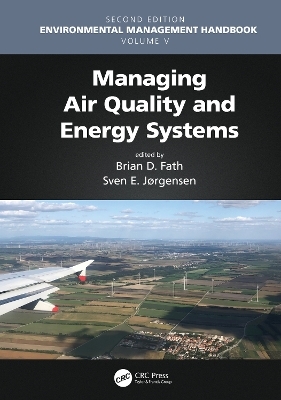
Managing Air Quality and Energy Systems
CRC Press (Verlag)
978-1-138-34267-5 (ISBN)
- Titel z.Zt. nicht lieferbar
- Versandkostenfrei
- Auch auf Rechnung
- Artikel merken
Bringing together a wealth of knowledge, the Handbook of Environmental Management, Second Edition, gives a comprehensive overview of environmental problems, their sources, their assessment, and their solutions. Through in-depth entries, and a topical table of contents, readers will quickly find answers to questions about pollution and management issues. This six-volume set is a reimagining of the award-winning Encyclopedia of Environmental Management, published in 2013, and features insights from more than 500 contributors, all experts in their fields.
The experience, evidence, methods, and models used in studying environmental management is presented here in six stand-alone volumes, arranged along the major environmental systems.
Features of the new edition:
The first handbook that demonstrates the key processes and provisions for enhancing environmental management.
Addresses new and cutting -edge topics on ecosystem services, resilience, sustainability, food-energy-water nexus, socio-ecological systems and more.
Provides an excellent basic knowledge on environmental systems, explains how these systems function and offers strategies on how to best manage them.
Includes the most important problems and solutions facing environmental management today.
In this second volume, Managing Air Quality and Energy Systems, the reader is introduced to the general concepts and processes of the atmosphere, with its related systems. This volume explains how these systems function and provides strategies on how to best manage them. It serves as an excellent resource for finding basic knowledge on the atmosphere, and includes important problems and solutions that environmental managers face today. This book practically demonstrates the key processes, methods, and models used in studying environmental management.
Brian D. Fath is a Professor in the Department of Biological Sciences at Towson University (Maryland, USA) and Research Scholar within the Advanced Systems Analysis Program at the International Institute for Applied Systems Analysis (Laxenburg, Austria). Prof. Fath has also taught courses on ecological networks and modeling in Portugal, China, Italy, Germany, Denmark, Croatia, France, Russia, and South Africa. He holds visiting faculty appointments at the School of Environment, Beijing Normal University and at the State Key Laboratory of Urban and Regional Ecology, Chinese Academy of Sciences both in Beijing, China. He was a Fulbright Distinguished Chair at Parthenope University of Naples, Italy in spring 2012 and recipient of the Prigogine Medal in 2016. His research is in the area of systems ecology and network analysis applied to the sustainability and resilience of socio-ecological systems. Prof. Fath has published more than 140 research papers, reports, and book chapters. He co-authored three books and is also the Editor-in-Chief for the journal Ecological Modelling; Editor-in-Chief for Encyclopedia of Ecology (2nd edition, to be published 2018); Secretary General of the International Society for Ecological Modelling; co-Chair of the Ecosystem Dynamics Focus Research Group in the Community Surface Modeling Dynamics System; and, member and past Chair of Baltimore County Commission on Environmental Quality.
Acid Rain. Acid Rain: Nitrogen Deposition. Air Pollution: Monitoring. Air Pollution: Technology. Climate Policy: International. Genotoxicity and Air Pollution. Global Climate Change: Carbon Sequestration. Global Climate Change: Earth System Response. Global Climate Change: Gas Fluxes. Global Climate Change: Gasoline, Hybrid-Electric and Hydrogen Fueled Vehicles. Global Climate Change: World Soils. Ozone Layer. Waste Gas Treatment: Bioreactors. Alternative Energy. Alternative Energy: Hydropower. Alternative Energy: Photovoltaics. Alternative Energy: Solar Thermal Energy. Alternative Energy: Wind Power Technology and Economy. Bioenergy Crops: Carbon Balance Assessment. Energy Commissioning: Existing Buildings. Energy Commissioning: New Buildings. Energy Conservation. Energy Conservation: Benefits. Energy Conservation: Industrial Processes. Energy Conservation: Lean Manufacturing. Energy Conversion: Coal, Animal Waste, and Biomass Fuel. Energy Efficiency: Low Cost Improvements. Energy Efficiency: New and Emerging Technology. Energy Master Planning. Energy Sources: Natural versus Additional. Energy Use: Exergy and Eco-Exergy. Energy Use: U.S. Energy: Environmental Security. Energy: Physics. Energy: Renewable. Energy: Solid Waste Advanced Thermal Technology. Energy: Storage. Energy: Walls and Windows. Energy: Waste Heat Recovery. Fossil Fuel Combustion: Air Pollution and Global Warming. Fuel Cells. Geothermal Energy Resources. Green Energy. Heat Pumps. Integrated Energy Systems. Petroleum: Hydrocarbon Contamination. Wind Farms: Noise.
| Erscheinungsdatum | 31.07.2020 |
|---|---|
| Reihe/Serie | Environmental Management Handbook, Second Edition, Six-Volume Set |
| Zusatzinfo | 129 Tables, black and white; 293 Illustrations, black and white |
| Verlagsort | London |
| Sprache | englisch |
| Maße | 178 x 254 mm |
| Gewicht | 1720 g |
| Themenwelt | Naturwissenschaften ► Biologie ► Ökologie / Naturschutz |
| Technik ► Elektrotechnik / Energietechnik | |
| Technik ► Umwelttechnik / Biotechnologie | |
| ISBN-10 | 1-138-34267-X / 113834267X |
| ISBN-13 | 978-1-138-34267-5 / 9781138342675 |
| Zustand | Neuware |
| Informationen gemäß Produktsicherheitsverordnung (GPSR) | |
| Haben Sie eine Frage zum Produkt? |
aus dem Bereich


